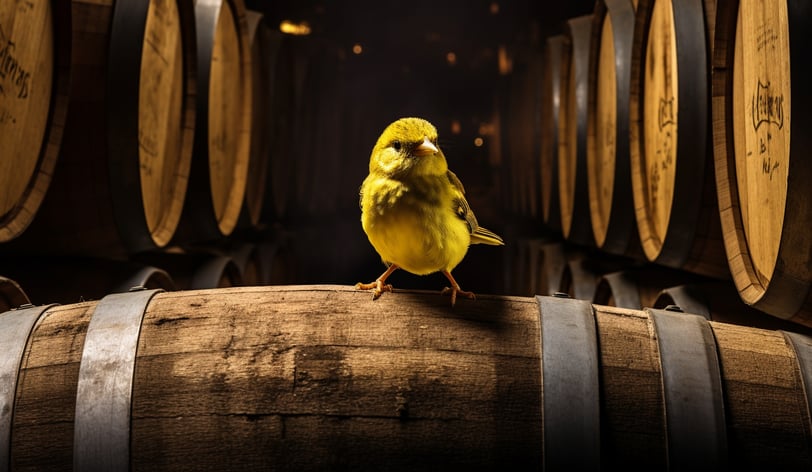Bordeaux: The Canary In The Cellar?
The wine industry has been quick to talk and slow to act when it comes to impending climate change adaptations.
8/4/20233 min read


The wine industry has grown increasingly vocal about the threats climate change poses, yet meaningful adaptation appears to gravely lacking. Reports routinely warn that warming conditions endanger the viability of prized regions and require evolving practices, but most iconic areas cling to conventions attuned to earlier eras rather than responding with reforms.
For example, Bordeaux has faced quantifiable climate shifts, with recent vintages bringing excessive heat spikes over 30°C along with increased drought conditions. This has led to grapes ripening beyond optimal ranges for the region's famous balanced red blend style. Entrenched regulations meanwhile inhibit using different grape varieties, clones, or viticulture techniques better suited for evolving realities. The contradictions between acknowledging climate change and resisting impactful changes are coming to a head. While proudly acknowledging global warming in interviews and marketing materials, the wine industry's complacency toward enacting adaptations may soon be exposed.
Bordeaux’s recent 2022 en primeur campaign signals a region in denial of climate change's threats. Despite châteaux now openly discussing the watering down of overripe grape must—which is still illegal—to preserve a semblance of balance, estates have achieved record price hikes averaging over 20% versus 2021. This paradox reveals a complacent bubble disconnecting prestige from actual wine quality (as it has historically been understood at least) and integrity as conditions shift. Bordeaux is a warning sign that reputation still heavily outweighs reality for elite regions. Its wines increasingly require manipulative interventions, yet it refuses deeper adaptation. Bordeaux is becoming the fine wine system’s poster child in inability to change.
In pursuit of maintaining perceived prestige, Bordeaux’s identity is fracturing under these climate pressures. And still, despite recent regulations allowing increased plantings of hybrids, most estates seem unwilling to explore alternative grape varieties or practices better suited to new realities. Instead, rampant cellar interventions like reverse osmosis and direct water additions to lower alcohol have begun to objectively sever modern Bordeaux terroir from its own wines. A dependence on high wine prices and a very specific, moderate alcohol style has led to desperation to recreate an increasingly outdated wine profile from unsuitable fruit.
Short-term technology tricks enable the illusion of continuity. Spinning cones, reverse osmosis, and adding water all allow the mimicking of Bordeaux’s wines of the past, but this artificial life support cannot resuscitate the region’s legacy indefinitely if warming continues. Soon no manipulation can mask the effects of grapes ripening beyond identities established in cooler times. Even now, excessive processing strips away nuance and natural variation between vintages. Is harvesting overripe grapes only to use lab techniques to design a better wine really what we are labeling as “terroir driven” now? What is to stop a winery in Arizona or Spain from making a wine equally as deserving of the Bordeaux name? If something doesn’t change, Bordeaux risks becoming a homogenized relic, perfectly engineered yet hollow at the core.
This growing divergence between reputation and wine quality presents a model to avoid for other regions. While many châteaux profit handsomely despite abandoning terroir transparency, this short-term gratification will injure Bordeaux’s stature long-term. The region refuses deeper philosophical reckonings needed to rediscover relevance and leadership befitting its prestige. And Bordeaux is simply the most prominent representation of fine wine’s identity crisis in changing environmental conditions. The rigid regulations many famous regions codified to protect reputations now shackle their ability to adapt. Clinging to these conventions rooted in lost eras will not forestall change; it ensures decline.
The grape-growing world should see Bordeaux 2022 as a dire warning against complacent faith in elite status to withstand inalterable climate shifts. Its doubled-down pursuit of inflated pricing and prestige presents wine’s possible traumatic future: loss of diversity and honesty to terroir in a frantic scramble to maintain inherently fleeting identities. Wine styles and pricing divorced from climate realities deceive everyone, from producers to collectors. The wise path forward is not desperate custodianship of dying legacies, but vision and innovation to craft newly relevant identities. This requires courage to deliberately evolve. Resilient wine cultures naturally adapt to new conditions while retaining continuity with heritage through core values, not superficial traits.
Whether the increases in recent prices, coupled with desperate wine making techniques, becomes Bordeaux’s downfall remains to be seen, and hopefully my opinions here are overly cynical. Either way, revered wine regions worldwide must observe Bordeaux’s crisis and summon the courage to change rather than similarly awaiting collapse. Visionary producers and consumers must lead the necessary philosophical transition. Traditions must be viewed as merely yesterday’s innovations, not as barriers preventing progress. The world is changing, and in order to keep up the wine industry needs to begin doing more than plant cover crops.

